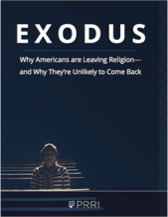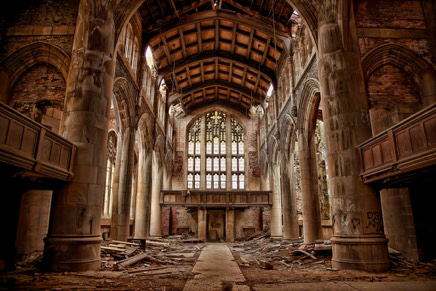
I attended the Diocese of GA’s Fall Clergy Conference these past few days at Honey Creek. Our presenter this time around was Bishop Anne Hodges-Copple, Bishop Pro Tem of the Diocese of North Carolina. Her topic was on engaging young adults in our communities. One of the things she shared was the recent results of a study done by PRRI, an organization that explores American culture, religion, and politics. The study, released last week, is entitled Exodus: Why Americans are Leaving Religion – and Why They’re Unlikely to Come Back.
With a title like that, it doesn’t sound very hopeful, which she was able to admit, and yet there is hope, nonetheless. The study sought to understand the largest religious group in America – those who choose, “none of the above” when it comes to religion, also known as the religiously unaffiliated. In the last 25 years, the percentage of Americans who self identify with this group has skyrocketed. In the early 1990s it was only around 5% of the population. Now it’s 25% and climbing faster than ever. To put that in perspective, for every mainline Protestant (Episcopal, Lutheran, Methodist, Presbyterian, etc.) there are three people who are unaffiliated.
Like me you’re probably wondering who’s in this group? Well, it is, in large part, young people. Roughly 40% in this group are under age 30, and another 30% are under age 50. Just ten years ago, the age groups in this category were not nearly so different in size. The younger population is really where the most movement away from organized religion is coming from. And these are not young people who have not learned about or been a part of religious households. On the contrary; these are people who are walking away from the religion they grew up with and learned in their families. Now nearly one in five Americans has left their religious upbringing and fall into the unaffiliated category.
That being said, some unaffiliated folks still believe in God and find value in religion. The larger percentage doesn’t. Researchers break the unaffiliated into three groups: the Apatheists, who don’t have a personal need for religion but think it’s generally helpful; the Unattached Believers, who do think religion is important to them, but who choose not to practice; and the largest group, the Rejectionists, who don’t find religion important, and in fact think religion is bad for society.

So what is happening to people that they are leaving the church? The most common reasons cited are because they simply stopped believing in religious teachings (60%), their family was never that religious when they were growing up (32%), and because of negative religious teachings about gay and lesbian people (29%). The majority of unaffiliated persons indicate that they have no desire to belong to a religious community and are not actively seeking one.
Are you feeling depressed yet? As one with the vocation as a priest, I am particularly troubled by the idea that nearly 20% of young people (and accelerating) are simply opting out of their religious upbringing – and that goes across the board in every Christian denomination. What the results tell us is that the issue isn’t with belief in God, but adhering to the teachings of institutional churches. More and more people, particularly young people, are finding meaning in other places.
As I said earlier, however, there is hope. A fair number of the unaffiliated still think that religious participation is good for learning morals and also think that children should be raised with religion for that reason. I also hope with all my heart that this is temporary; a reaction to the world we live in and the “old ways” of the institutional churches. If you think about the classic parish model that has been dominant over the last 50 years, it isn’t working for younger generations any longer. Churches used to be the connection point to the world for many people; it was where you had your social needs met; it was a place to live out your faith by taking part in the religious community’s events, a.k.a. “We should give everyone a job in the church”; social value of being in a religious community was greater than the spiritual value.
Younger generations don’t want to support an institution, but they do want an active faith. They don’t want to worry about auxiliary groups, but they do want to serve Jesus in tangible ways. The Church is slowly reclaiming its place as the chief steward of discipleship, achieved through transcendent worship, teaching and facilitating spiritual practices, and returning to hands-on service where a non-profit mindset had taken over. These are the sorts of things that set us apart from other institutions and agencies. We’re the only ones who can really offer meaningful worship and sacrament, for example.
The hope for the future is found in the rebirth of the church. The late Phyllis Tickle suggested that Christianity has been shaken up, on average, about every 500 years and that what we’re seeing now – this very dynamic of shrinking churches – was the beginning of that process. The Church will not die in the traditional sense; it will be reborn long before that happens. Perhaps the better image is resurrection. I may be foolish in hoping and praying for it, but I fervently believe, as I’ve said many times before, that if we focus on worship, spiritual formation and growth, and discipleship, the church will thrive and grow and spread as it did in the Apostolic Era.
The world desperately needs the message of the Gospel and God’s love more than ever. The level of fear and distrust among the peoples of this nation, let alone the world, and the lack of civility in our public officials should signal that, if nothing else does. We’re losing our decency, our vision for the future, and our way to make it a reality. I think the Church holds the keys if we can stay on task. I am not ready to give up on young adults, or anyone for that matter. Too much is at stake.
Tom+
O God, sustain your Church as we face new tasks in the confusions of this changing world. By your Holy Spirit give us good judgment and the strength to persevere, so that we may boldly bear witness to the coming of your kingdom; through Jesus Christ our Lord. Amen.
